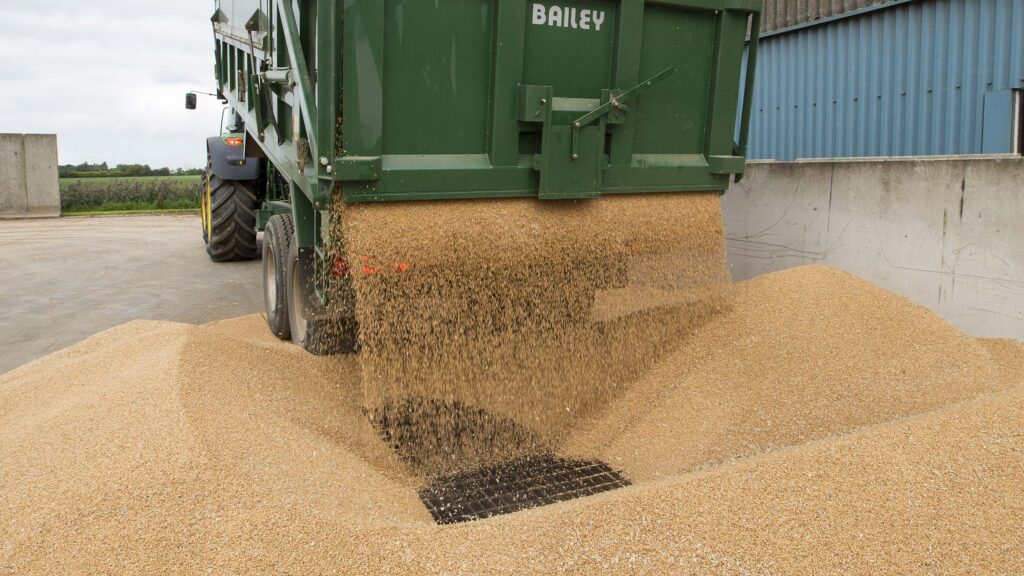Disgruntled cereal growers start milling wheat ‘strike’ in April
 © GNP
© GNP A first national farmers “strike” is under way, with a number of farmers refusing to load milling wheat out of stores for the next two weeks, in protest at the raft of Labour government policies that are hitting the industry hard.
Staffordshire farmer Clive Bailye, one of the strike organisers, said the action had been in planning for a while, but had been kept quiet “to avoid merchant/retailer planning and profiting from this”.
See also: Farmers seek legal advice over sudden closure of SFI
As an opening comment on The Farming Forum website, Mr Bailye declared: “No hot cross buns for Easter! No BBQ baps! It maybe April Fools’ Day, but Britain’s food security is no joke.
“If you are a milling wheat grower, join others and do not load from 1 April for at least the first two weeks of the month,” he urged, noting that “if you have an existing contract, you have until the end of the month to deliver it”.
Non-wheat growers were also encouraged to visit their local shops and “buy a bit extra”. “Get those shelves empty faster, we have seen panic buying on fuel and toilet rolls in the past,” said Mr Bailye.
Merseyside farmer Ollie Harrison, a fellow organiser, also took to social media to spread the message, explaining that any shortages of bread and hot cross buns were the fault of government policies.
“Farmers that are growing milling wheat have gone on strike from 1 April,” he said. “They will not be loading any trucks of milling wheat and we’re going to probably run out of flour, which means we will run out of hot cross buns and bread.
“So, if you wonder why the shelves are empty, get on to your local MP and say you need to help these farmers out – you can’t carry on putting them out of business.”
Minister quizzed
Defra farming minister Daniel Zeichner was quizzed on the development on Tuesday (1 April) morning at a meeting of the Environment, Food and Rural Affairs (Efra) committee.
Chairman Alistair Carmichael asked what might be the impact and how Mr Zeichner might feel about being the food minister that took hot cross buns off the table for Easter.
“I understand the unhappiness that’s out there, but equally I’m very confident that we have resilient supply chains,” Mr Zeichner replied.
“I would encourage people to engage in dialogue with us about the future. The secretary of state and I are frequently talking to farming organisations and we have good dialogue with them and understand the unhappiness.”
Consequences
But Scottish Conservative MP Harriet Cross said the strike was a direct consequence of the Labour government’s abandonment of British farming .
“Farmers have been pushed into a corner by Keir Starmer and now feel they have no choice other than to take this action, which could be replicated across the UK,” she said.
“He is crippling the industry with Labour’s family farm tax, rises to employer National Insurance contributions and a new fertiliser levy.
“This action should send a warning to Keir Starmer that our farmers are not going to accept this government’s attack on their livelihoods lying down.”
Effectiveness
The likely effectiveness of the strike has been called into question by some, however.
Grain trade consultant Richard Whitlock described the move as “foolish”.
“At present, there’s too much milling wheat in the country, that’s why feed wheat base prices and milling premiums have been dropping over recent months,” he said.
Mr Whitlock also pointed out that the AIC No 1 contract stated that the wheat should be available for collection in the month of contract “at buyer’s call”.
“If farmers refuse to load, they could be in default,” he said. “However, the fall in grain prices will very likely mean that contract [values] are above today’s market price, so any buyer will be pleased to cancel an existing contract due to a farmer’s refusal to load.”
